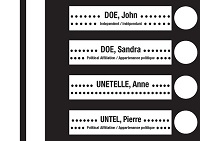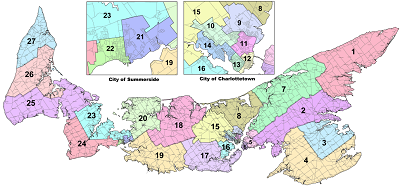Canada's electoral history from 1867 to today
Base → Elections → Introduction and statistics
More than 155 years of voting in Canada
by Maurice Y. Michaud (he/him)
 It never ceases to amaze me when people complain about "having yet another election." I only need to think about the failed attempt in the first 20 years of the 21st century to install some form of democracy in Afghanistan, or the current bloody struggle of Ukrainians to preserve their democracy, as imperfect as it is or was, to come to a deep appreciation of how precious Canada's democracy is, despite its flawed electoral system.
It never ceases to amaze me when people complain about "having yet another election." I only need to think about the failed attempt in the first 20 years of the 21st century to install some form of democracy in Afghanistan, or the current bloody struggle of Ukrainians to preserve their democracy, as imperfect as it is or was, to come to a deep appreciation of how precious Canada's democracy is, despite its flawed electoral system.
Although Canadians are often accused of being smug when comparing themselves with their neighbours to the south, it is indisputable to me that the blush is off the rose that presents itself as "The Beacon of Democracy." Although we, too, are witnessing a sharper polarization within the electorate, at least we do not have to contend with systemic flaws that would make us vulnerable to shenanigans like gerrymandering, as is the case in the United States. As such, each time we are called to the polls, we should be celebrating and giving thanks to the fact that we have something that many people around the world would literally kill to have!
There! I am done editorializing, so let me tell you how many electoral events are recorded in PoliCan and about which you can find all the details in this section of the website.
This table shows, by jurisdiction, the year of the earliest and latest recorded event as well as the number of the earliest and current assembly (or of the last one in the case of the North-Western Territory).
- Keep in mind that, for each general election (Elec), there is an individual race in each riding, while more than one race could occur during any given by-election.
- What's more, note that this table makes a distinction between the absolute number of races (N) and the number of real races (n) by subtracting from the former the number of races won by acclamation (Accl.).
- There are 253 by-election races that are currently labelled as fake acclamations (Acc?) because the data is missing, the vast majority being in Ontario and Prince Edward Island. These "Acc?" tags represent 68.04% of by-election races won by acclamation in Ontario and 53.75% of those in P.E.I., but 49.13% and 28.29% of all by-election races in those jurisdictions. The PoliCan database would be complete if it weren't for those "Acc?" tags; instead, it is 99.37% complete.
- Referendums can never be won by acclamation as they are by definition questions (Q) offering a choice between at least two options.
- Ministerial by-elections (Minis.) are a subset (16.23% of all by-elections). In the Westminster parliamentary system as practised in most jurisdictions in Canada up until the 1930s, a person who was named to the cabinet for the first time was required to resign their seat and run in such an election soon afterwards. Many of those were won by acclamation, and extremely rare were the times when a newly minted minister would fail to regain their seat even if it was challenged.
In short, the PoliCan database contains about 2,700 "elections" since 1866, with more than 40,000 individual "races" within them. Although Confederation only began in 1867, New Brunswick's 1866 general election is widely viewed today as its first of the Confederation era, while the three other new provinces each held a general election in 1867. Similarly, the 1873 general election on Prince Edward Island was held a few months before the province formally joined Confederation.
The detailed results of some by-elections still have to be found and recorded.
- I have little hope of ever finding the missing data for 43 by-elections in Prince Edward Island. The reason is that, in the smallest provincial jurisdiction, Elections PEI has the most incomplete and chaotic record keeping practices. They produce beautiful statistical reports that consistently fail to give (or make hard to find) data points that really matter, like the number of eligible voters and the number of rejected votes, so unless they're hiding this data in some secret vault (which I doubt)... What's more, for more than 200 years, ridings were merely numbered slices of the three provincial counties, with each county having five two-member ridings (e.g., Kings / Prince / Queens 1st, 2nd, 3rd...), with Queens getting a sixth two-member riding for Charlottetown starting in 1966.
Despite switching to 27 named single-member districts in 1996, Elections PEI seems to remain stuck in thinking in numbered district terms: "See the results of the by-election in District 16" instead of "See the results of the by-election in Cornwall—Meadowbank." And for the general elections from 1966 to 1993, the sum of enumerated voters in each district is greater than the province's population at the time! So let's just say that I struggled and still struggle to find, interpret and enter the electoral results of a province that has a smaller population than the City of Sherbrooke or 29 other Canadian cities!
- On the other hand, the largest provincial jurisdiction, Ontario, has one of the most complete datasets online provided by Elections Ontario, but the details of by-elections prior to 1987 are not posted and are available only in hard copy at their office and in some public libraries. With the naive hope that if I gave a little I might get a little, I respectfully submitted to Elections Ontario in March 2021 a listing of 180 errors I had found in their "Data Explorer" application, hoping that, in exchange, they would consider adding to it the 198 missing by-election result sets. Not only did they decline to entertain the idea; 166 of the 180 errors I flagged remained in their application as of late December 2022. I suppose I failed to establish trust that my endeavour is serious and meticulous and that I really did go through their entire data set, so I might just have to go visit them in Toronto or an archive library in Ontario to get what's missing.
Nevertheless, nowhere other than PoliCan will you find
99.37% of the electoral results in Canada since Confederation in 1867, in a standardized, searchable format and with so many links expanding on the people who ran for office.
© 2019, 2024 :: PoliCan.ca (
Maurice Y. Michaud)
Pub.: 23 Dec 2021 10:07
Rev.: 29 Apr 2023 11:02 (but data presented dynamically)


 It never ceases to amaze me when people complain about "having yet another election." I only need to think about the failed attempt in the first 20 years of the 21st century to install some form of democracy in Afghanistan, or the current bloody struggle of Ukrainians to preserve their democracy, as imperfect as it is or was, to come to a deep appreciation of how precious Canada's democracy is, despite its flawed electoral system.
It never ceases to amaze me when people complain about "having yet another election." I only need to think about the failed attempt in the first 20 years of the 21st century to install some form of democracy in Afghanistan, or the current bloody struggle of Ukrainians to preserve their democracy, as imperfect as it is or was, to come to a deep appreciation of how precious Canada's democracy is, despite its flawed electoral system.